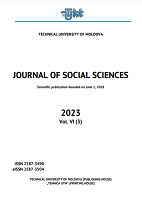OPTIMIZAREA ÎNVĂȚĂRII REȚELELOR DE CALCULATOARE PRIN ELEARNING SECVENȚIAL BAZAT PE TEHNOLOGIA DIGITALĂ
OPTIMIZING COMPUTER NETWORK LEARNING THROUGH SEQUENTIAL ELEARNING BASED ON DIGITAL TECHNOLOGY
Author(s): Ludmila Peca, Roza Dumbrăveanu, Dinu ŢurcanuSubject(s): School education, Sociology of Education, Distance learning / e-learning
Published by: Universitatea Tehnică a Moldovei
Keywords: eEducation; eLearning strategies; MLS course; test; methodical guidance; open courses; evaluation; horizontal correlation;
Summary/Abstract: Practical experiences applied in the design of modules for the Computer Networks (CN) course unit are described, taking into account the main elements in this process, the specifics of teamwork, the structure and content of the 27 recorded modules/lessons (17 video lessons for teaching the theoretical content and 10 lessons for practical laboratory content), forms of teaching material representation and applied Information and Communication Technology (ICT) tools. The concept of multiple step learning (MLS) is a way to create eLearning courses that reflect the knowledge up to the course or topic to be discussed. The RC course unit is described as innovative with eLearning, content presented at different levels of complexity and each next stage explaining the topic in more detail than the previous content (interdisciplinary connections for better understanding). Based on student feedback, the MLS RC for the 2022/2023 study year has been supplemented with 2 methodical guidelines for carrying out practical and laboratory work (the first guideline medium level of complexity, guideline 2 high level of complexity – laboratory instructions explained step by step).
Journal: Journal of Social Sciences
- Issue Year: VI/2023
- Issue No: 3
- Page Range: 126-140
- Page Count: 15
- Language: Romanian

